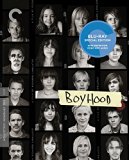| Reviews & Columns |
|
Reviews DVD TV on DVD Blu-ray 4K UHD International DVDs In Theaters Reviews by Studio Video Games Features Collector Series DVDs Easter Egg Database Interviews DVD Talk Radio Feature Articles Columns Anime Talk DVD Savant Horror DVDs The M.O.D. Squad Art House HD Talk Silent DVD
|
DVD Talk Forum |
|
|
| Resources |
|
DVD Price Search Customer Service #'s RCE Info Links |
|
Columns
|
|
|
Boyhood: The Criterion Collection
The Criterion Collection // R // October 11, 2016
List Price: $39.95 [Buy now and save at Amazon]
The Film:
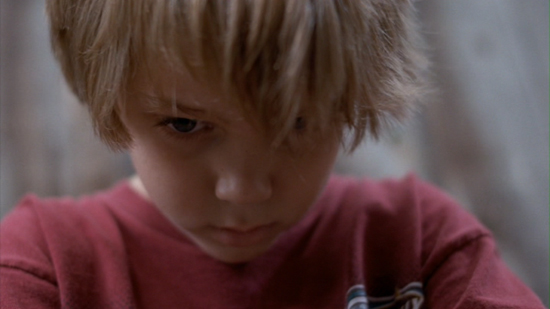
Few films are as appreciated sight unseen as Richard Linklater's Boyhood, his decade-long project in depicting the maturation of a boy from his prepubescent years all the way to his high-school graduation. The idea itself, filtered through the lens of the slice-of-life director responsible for Dazed and Confused and the Before ... series, amasses its own mix of expectation and respect for its ambition before the first frame even appears: the sporadic gathering of the same actors across a twelve-year period to tell an observable and cohesive coming-of-age story, of both the boy himself and the family around him. For the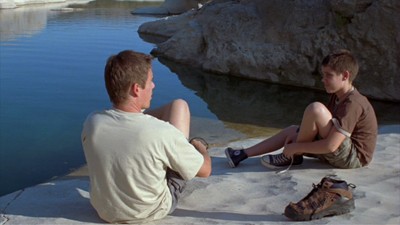 film to exist at all is a marvel; however, Linklater does things with the material befitting a director whose artistic method goes beyond simply gluing together scenes that sprawl across time. Cleverly perceptible transitions between years and unostentatious references to each time period allow Mason's story, at times subtle and other times harrowing, to blossom into a marvelous portrayal of growing up, parenting, and the path that leads someone towards discovering who they are.
film to exist at all is a marvel; however, Linklater does things with the material befitting a director whose artistic method goes beyond simply gluing together scenes that sprawl across time. Cleverly perceptible transitions between years and unostentatious references to each time period allow Mason's story, at times subtle and other times harrowing, to blossom into a marvelous portrayal of growing up, parenting, and the path that leads someone towards discovering who they are.
Instead of banging out a traditional synopsis for Boyhood, it'd be easier to list off a stream of themes -- intermittent absence of a (not-so-bad) biological parent, alcohol abuse, moving between towns, peer pressure, employment, interacting with the opposite sex -- than force the film to have more of a finite narrative than it really has. Let's just go with something simple: written and directed by Linklater, Mason's (Ellar Coltrane) story captures the nuances, both physical and emotional, of a young boy's growth into the man he's intended to be. His mother, Olivia (Patricia Arquette), struggles with the lack of a father figure in raising both her children. The attitude of her eldest, Samantha (Lorelei Linklater), towards Mason can be described as tolerant at its best, though that also kinda seems to apply to her outlook on life itself as she gets older. His frayed-edged father, Mason Sr. (Ethan Hawke), isn't around very much and can't seem to hold down a job between musings of being a musician, but ultimately he's a caring and nurturing individual who's kept at arm's length for a number of reasons.
Then, there's Mason, whose soulful eyes and hushed disposition hold a specific purpose in Boyhood. Aside from the fact that he's obviously a decent kid without behavior or authority issues, his personality doesn't really shine at first, largely because he's absorbing the events transpiring around him instead of directly reacting to them -- until he's pushed over a line. He's an observer, our eyes and ears into his powerless world, something that takes hold in him and never seems to let go over time. It's a truly singular experience to watch Ellar Coltrane change gradually between each segment of his character's life: the emergence of his voice as an actor masquerades underneath Mason's growth into a subtle, tolerant personality, with life and art constantly imitating each other as he matures. Whether Boyhood would have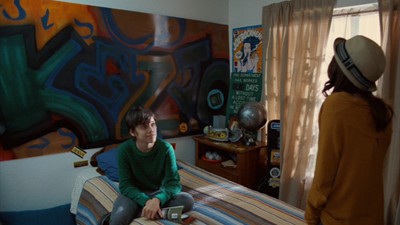 worked if Mason had been more assertive and extroverted is hard to tell; that said, his reserved attitude feels suitable for the youngest sibling in an at-times chaotic and volatile environment.
worked if Mason had been more assertive and extroverted is hard to tell; that said, his reserved attitude feels suitable for the youngest sibling in an at-times chaotic and volatile environment.
As Mason responds to the world around him, so too does Richard Linklater's perspective as a filmmaker between the segments of Boyhood, yet it never feels like he's produced individual vignettes despite the jumps in time and shifts in theme. Working off $200k-a-year funding with immense creative freedom, the project slowly reveals itself to be a patchwork tapestry that understands how to make the events in Mason's life come across as both episodic and seamless, with a clear idea of what the final product's going to look like. Linklater's rich taste in music and grasp on modern culture, from video-game systems and Harry Potter to political races, recalls the time period in understated yet noteworthy bursts that mesh together with the evolving family dynamics. Subtle things, even happy accidents, allow the progression of time to be observable, inviting the audience to pay attention those small details -- even Mason's hairstyle -- as natural reminders. Linklater's coming-of-age as a director can also be seen in parallel with Mason's story; the brisk energy in his youth feels more like Before Sunset, which then embraces the calmer and more methodical tempo found in Before Midnight during his later years.
Written by Linklater with generous assistance from his actors to inform the temperament of their individual characters, Boyhood feels less like a structured coming-of-age yarn and more like a stream of consciousness in the mind of an almost-adult reminiscing on his youth before taking big steps into adulthood. Just like life, there isn't much of an act structure to Mason's experiences; distressing and life-altering events occur early in his youth that elevate the dramatic tension, and everything else afterward feels tame in comparison. That's the way unshakable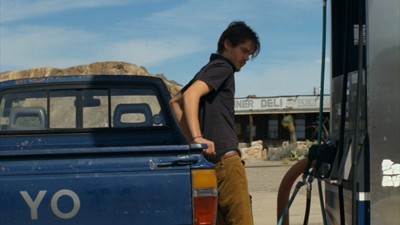 experiences operate sometimes, though, and that's part of what makes Boyhood a poignant piece of work: Linklater depicts the ways in which the family struggles with what darkens their past, and how it impacts who they become in the future. Shadows and glimmers of experiences endured by other people emerge in Mason's story, whether it's as simple as going to school with a bad haircut and dealing with a problem sibling or as potent as fearing one's stepfather, building into an intimate and relatable depiction of growing up with an almost universal awareness of the fabric of memories.
experiences operate sometimes, though, and that's part of what makes Boyhood a poignant piece of work: Linklater depicts the ways in which the family struggles with what darkens their past, and how it impacts who they become in the future. Shadows and glimmers of experiences endured by other people emerge in Mason's story, whether it's as simple as going to school with a bad haircut and dealing with a problem sibling or as potent as fearing one's stepfather, building into an intimate and relatable depiction of growing up with an almost universal awareness of the fabric of memories.
Given the unconventional schedule and the inherent scope of the project, Linklater preserves the illusion of realism in different ways with Boyhood. His most successful method comes in not lingering on one period of time for longer than needed, quickly and organically weaving together the director's existential conversations with delicate, unobtrusive camerawork that follows memorable scenes in Mason's life: the release of a popular book and a conversation about real-world magic; the time his father offered birth-control advice at a bowling alley; the time he lost the girl. What results is a film that's nearly double the length of the director's other musings on life that passes by just as briskly, where all the experiences funnel into an adult vessel at the end who's capable of embracing the resulting thoughts, sorrows, and aspirations. Boyhood gives those watching this rare fly-on-the-wall view of exactly what shapes a person into who they'll ultimately become, and Linklater's ambitious and intimate project ensures that Mason's end result -- flaws and all -- makes sense every step of the way.
Note: Film Review (And Screenshots) from Coverage of 2015's Blu-ray release of Boyhood: Review Here.
The Blu-ray:
Took a little longer than some were probably anticipating, but Boyhood finally moves into the Criterion Collection as spine #839, arriving in a two-disc set contained within one of the label's standard clear-case designs. The artwork -- on the front, on the interior artwork, and on the discs themselves -- feature shots of the cast members throughout the film's creation, carrying over into the substantial Booklet also included with the film. Along with cast credits and information about the transfer, you can also find an essay entitled "The Moment Seizes You", by Jonathan Lethem.
Video and Audio:
Kinda like Mason Jr. in the film itself, we're given the chance to see Boyhood mature on Blu-ray from the standard edition released at the beginning of last year to this presentation from The Criterion Collection, the third of Richard Linklater's films to ride into the boutique label. The technique employed in capturing the maturation of the young boy has a secondary effect: it also serves as a time capsule for the director's shifting cinematic style. One can see the brighter, cooler, somewhat pulled-back look at Mason's early years as a reflection of Linklater's style in the likes of Before Sunset and School of Rock, which segues into the kind of richer, darker tones that emerged in Bernie and, most recently, Before Midnight. Each of the seamlessly stitched-together portions were shot on 35mm film for a relatively consistent aesthetic, sporting a controlled yet earthy veil of grain that relishes the naturality of scenes in homes, at school, and outdoors.
As can be expected from two releases of a 2014 film, the differences between the two high-definition presentations are subtle, but noticeable with scrutiny. For one, Criterion's newly-scanned 2K-resolution treatment presents the film in its correct aspect ratio of 1.85:1, instead of the prior release's 1.78:1-framed transfer, and it's a shade either darker or lighter depending on the scenes being focused upon. Criterion's transfer tends to be a hair warmer in many sequences, rendering incrementally more natural skin tones and robust shades in grass greens and brick reds, and sports slightly more stable, natural film grain. There's probably about the same amount of mild print speckles between the two, both have their fair share of deep black levels that get too close for comfort in darkening details in shadows, and the level of detail remains impressive no matter which you're viewing; strands of hair, patterns in garments, and earthy textures in the wilderness are pronounced regardless. The edge, however, goes to Criterion's slightly more refined compression, even contrast balance, convincing warmth of palette ... and aspect ratio accuracy.
Aside from Richard Linklater's consistently on-point choice of music, the sound presentations for his films don't typically have a lot of big sonic effects, instead embracing the subtlety of dialogue tonal fluctuations and faint atmospropheric effects. Therefore, discerning the differences between the older DTS-HD Master Audio track and this new one from The Criterion Collection -- remastered from the original digital files using ProTools HD -- is a matter of slight boosts in clarity, heftiness, and expansion across the channels. Linklater's song choices, from Coldplay to Soulja Boy and Vampire Weekend, enjoy robust upticks as they more effortlessly expand across the surround channels. The increase in their presence is equally matched by the track's elevation of the dialogue and other sound effects, usually the cruising of cars and closing of doors, which are, quite simply, faultlessly organic. The true, notable improvements here can be found in the mildest of sonic effects, like the pouring of liquor into a plastic icecube-filled cup, the scrolling of skateboard wheels on pavement, and the shutter of a camera, while a few bold effects -- the blast of a shotgun and the shattering of a glass -- remain potent. For its objectives, Boyhood sounds phenomenal here.
Special Features:
Sure, there are marginal upticks in audiovisual quality that make Criterion's release of Boyhood worth seeking out, but the real reason to pursue this release comes in the arrangement of extras compiled by the label ... and, man, this one is busting at the seams. Most of the supplements appear on the second disc, but the feature-film disc comes equipped with a new Audio Commentary featuring Richard Linklater and a collection of rotating crew members all discussing the film. It's an anecdote-filled discussion: the director mentions the rationale behind including certain pop-culture touches (Dragon Ball Z, Soulja Boy, Obama signs pre-victory), while the scene-by-scene discussion with the cast mostly revolves around shooting locations, storytelling objectives, and the pressures of getting performances right. Linklater and his participants don't try to force the discussion, instead letting filmmaking discussion evolve in what's definitely a casual conversation.
 The extent of the behind-the-scenes footage seen in the twenty-minute featurette in Paramount's Blu-ray release was only the tip of the iceberg, seen in the cornerstore Twelve Years (49:28, 16x9 HD) "documentary" found on Disc Two. Depth of discussion isn't really the purpose with the interviews in this extra; instead, it offers a fluid portrait of what progressing through the making of Boyhood was actually like for the people involved, marrying behind-the-scenes footage with the finished scenes from the film. It's more a visual curiosity and time-capsule representation than a explorative "documentary", but that meshes well with the objectives of the film itself.
The extent of the behind-the-scenes footage seen in the twenty-minute featurette in Paramount's Blu-ray release was only the tip of the iceberg, seen in the cornerstore Twelve Years (49:28, 16x9 HD) "documentary" found on Disc Two. Depth of discussion isn't really the purpose with the interviews in this extra; instead, it offers a fluid portrait of what progressing through the making of Boyhood was actually like for the people involved, marrying behind-the-scenes footage with the finished scenes from the film. It's more a visual curiosity and time-capsule representation than a explorative "documentary", but that meshes well with the objectives of the film itself.
The series of discussions underneath Twelve Years are responsible for the depth of discussion, starting with the lengthy Memories of the Present (57:35, 16x9 HD), which features Richard Linklater, Ellar Coltrane, and Patricia Arquette in a chat with moderator/producer John Pierson. They delve into the emotional, personal aspects of creating and viewing the film: the deliberate distance they kept from seeing the evolving film itself over the years; how the project could've gone in different directions depending on how Ellar and the other cast had different life experiences; how the film avoids many big landmarks in Mason Jr.'s life, which translates into a different kind of reward for expectations of the film; and, of course, how it intersects with reality. Always Now (30:10, 16x9 HD) takes on a similar tone, but instead it brings together Ethan Hawke and Ellar Coltrane in a one-on-one chat, which affords them the chance to discuss working with Linklater a little more candidly and directly and how the film's a combination of their collective characterizations and experiences.
The Criterion Collection have also included a really cool video essay, Time Of Your Life (12:29, 16x9 HD), compiled by critic Michael Koresky and narrated by Ellar Coltrane, centered on the theme of timelessness in cinema and how it weaves together with Linklater's ouevre; clips from the Before ... trilogy appear here, which, of course, gets one really excited about certain possibilities with the Criterion Collection. Finally, a twenty-minute visual catalogue of still photos taken during the making of the film, entitled Through the Years (23:59, 16x9 HD), features narration from photographer Matt Lankes, director Richard Linklater, and Hawke, Arquette, and Coltrane that's been taken from a book chronicling the photographs, entitled "Boyhood: Twelve Years on Film".
Final Thoughts:
There's more to Boyhood than its artistic premise. Sure, the prospect of seeing an actor grow up over twelve years in one cinematic story, essentially from his first year of education to his high-school graduation, is an immediate and compelling hook that makes one purely marvel at what's transpiring on-screen: the progression of a unique kid into a unique adult. However, Richard Linklater's keyhole glimpse at a brother and sister caught between divorced parents follows consistent, meaningful, naturally-evolving threads about the development of personalities, the challenges of domestic hardships, and the transitions families undergo between stages in their lives. Genuine performances and Linklater's intimate, evocative style allow the film to effortlessly flow from point to point in Mason Jr.'s life, building into -- as I stated in my previous review -- "a sprawling, heartening, and poetic depiction that comes about as close to capturing the full growth of a character over twelve years of childhood as one can expect." The Criterion Collection have built a pretty incredible Blu-ray package for the film, consisting of impressive audiovisual properties and, the bigger reason to upgrade, a bounty of extras that include a commentary, a three-quarter-hour documentary, and several earnest conversations with the cast. DVDTalk Collector's Series.
Thomas Spurlin, Staff Reviewer -- DVDTalk Reviews | Personal Blog/Site

Few films are as appreciated sight unseen as Richard Linklater's Boyhood, his decade-long project in depicting the maturation of a boy from his prepubescent years all the way to his high-school graduation. The idea itself, filtered through the lens of the slice-of-life director responsible for Dazed and Confused and the Before ... series, amasses its own mix of expectation and respect for its ambition before the first frame even appears: the sporadic gathering of the same actors across a twelve-year period to tell an observable and cohesive coming-of-age story, of both the boy himself and the family around him. For the
 film to exist at all is a marvel; however, Linklater does things with the material befitting a director whose artistic method goes beyond simply gluing together scenes that sprawl across time. Cleverly perceptible transitions between years and unostentatious references to each time period allow Mason's story, at times subtle and other times harrowing, to blossom into a marvelous portrayal of growing up, parenting, and the path that leads someone towards discovering who they are.
film to exist at all is a marvel; however, Linklater does things with the material befitting a director whose artistic method goes beyond simply gluing together scenes that sprawl across time. Cleverly perceptible transitions between years and unostentatious references to each time period allow Mason's story, at times subtle and other times harrowing, to blossom into a marvelous portrayal of growing up, parenting, and the path that leads someone towards discovering who they are. Instead of banging out a traditional synopsis for Boyhood, it'd be easier to list off a stream of themes -- intermittent absence of a (not-so-bad) biological parent, alcohol abuse, moving between towns, peer pressure, employment, interacting with the opposite sex -- than force the film to have more of a finite narrative than it really has. Let's just go with something simple: written and directed by Linklater, Mason's (Ellar Coltrane) story captures the nuances, both physical and emotional, of a young boy's growth into the man he's intended to be. His mother, Olivia (Patricia Arquette), struggles with the lack of a father figure in raising both her children. The attitude of her eldest, Samantha (Lorelei Linklater), towards Mason can be described as tolerant at its best, though that also kinda seems to apply to her outlook on life itself as she gets older. His frayed-edged father, Mason Sr. (Ethan Hawke), isn't around very much and can't seem to hold down a job between musings of being a musician, but ultimately he's a caring and nurturing individual who's kept at arm's length for a number of reasons.
Then, there's Mason, whose soulful eyes and hushed disposition hold a specific purpose in Boyhood. Aside from the fact that he's obviously a decent kid without behavior or authority issues, his personality doesn't really shine at first, largely because he's absorbing the events transpiring around him instead of directly reacting to them -- until he's pushed over a line. He's an observer, our eyes and ears into his powerless world, something that takes hold in him and never seems to let go over time. It's a truly singular experience to watch Ellar Coltrane change gradually between each segment of his character's life: the emergence of his voice as an actor masquerades underneath Mason's growth into a subtle, tolerant personality, with life and art constantly imitating each other as he matures. Whether Boyhood would have
 worked if Mason had been more assertive and extroverted is hard to tell; that said, his reserved attitude feels suitable for the youngest sibling in an at-times chaotic and volatile environment.
worked if Mason had been more assertive and extroverted is hard to tell; that said, his reserved attitude feels suitable for the youngest sibling in an at-times chaotic and volatile environment. As Mason responds to the world around him, so too does Richard Linklater's perspective as a filmmaker between the segments of Boyhood, yet it never feels like he's produced individual vignettes despite the jumps in time and shifts in theme. Working off $200k-a-year funding with immense creative freedom, the project slowly reveals itself to be a patchwork tapestry that understands how to make the events in Mason's life come across as both episodic and seamless, with a clear idea of what the final product's going to look like. Linklater's rich taste in music and grasp on modern culture, from video-game systems and Harry Potter to political races, recalls the time period in understated yet noteworthy bursts that mesh together with the evolving family dynamics. Subtle things, even happy accidents, allow the progression of time to be observable, inviting the audience to pay attention those small details -- even Mason's hairstyle -- as natural reminders. Linklater's coming-of-age as a director can also be seen in parallel with Mason's story; the brisk energy in his youth feels more like Before Sunset, which then embraces the calmer and more methodical tempo found in Before Midnight during his later years.
Written by Linklater with generous assistance from his actors to inform the temperament of their individual characters, Boyhood feels less like a structured coming-of-age yarn and more like a stream of consciousness in the mind of an almost-adult reminiscing on his youth before taking big steps into adulthood. Just like life, there isn't much of an act structure to Mason's experiences; distressing and life-altering events occur early in his youth that elevate the dramatic tension, and everything else afterward feels tame in comparison. That's the way unshakable
 experiences operate sometimes, though, and that's part of what makes Boyhood a poignant piece of work: Linklater depicts the ways in which the family struggles with what darkens their past, and how it impacts who they become in the future. Shadows and glimmers of experiences endured by other people emerge in Mason's story, whether it's as simple as going to school with a bad haircut and dealing with a problem sibling or as potent as fearing one's stepfather, building into an intimate and relatable depiction of growing up with an almost universal awareness of the fabric of memories.
experiences operate sometimes, though, and that's part of what makes Boyhood a poignant piece of work: Linklater depicts the ways in which the family struggles with what darkens their past, and how it impacts who they become in the future. Shadows and glimmers of experiences endured by other people emerge in Mason's story, whether it's as simple as going to school with a bad haircut and dealing with a problem sibling or as potent as fearing one's stepfather, building into an intimate and relatable depiction of growing up with an almost universal awareness of the fabric of memories. Given the unconventional schedule and the inherent scope of the project, Linklater preserves the illusion of realism in different ways with Boyhood. His most successful method comes in not lingering on one period of time for longer than needed, quickly and organically weaving together the director's existential conversations with delicate, unobtrusive camerawork that follows memorable scenes in Mason's life: the release of a popular book and a conversation about real-world magic; the time his father offered birth-control advice at a bowling alley; the time he lost the girl. What results is a film that's nearly double the length of the director's other musings on life that passes by just as briskly, where all the experiences funnel into an adult vessel at the end who's capable of embracing the resulting thoughts, sorrows, and aspirations. Boyhood gives those watching this rare fly-on-the-wall view of exactly what shapes a person into who they'll ultimately become, and Linklater's ambitious and intimate project ensures that Mason's end result -- flaws and all -- makes sense every step of the way.
Note: Film Review (And Screenshots) from Coverage of 2015's Blu-ray release of Boyhood: Review Here.
The Blu-ray:
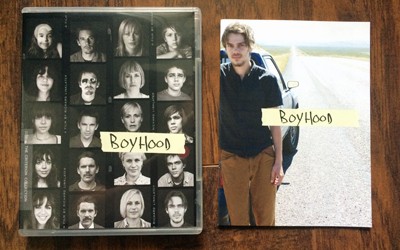 | 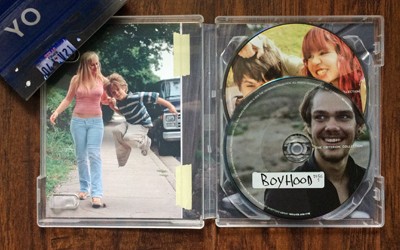 |
Took a little longer than some were probably anticipating, but Boyhood finally moves into the Criterion Collection as spine #839, arriving in a two-disc set contained within one of the label's standard clear-case designs. The artwork -- on the front, on the interior artwork, and on the discs themselves -- feature shots of the cast members throughout the film's creation, carrying over into the substantial Booklet also included with the film. Along with cast credits and information about the transfer, you can also find an essay entitled "The Moment Seizes You", by Jonathan Lethem.
Video and Audio:
Kinda like Mason Jr. in the film itself, we're given the chance to see Boyhood mature on Blu-ray from the standard edition released at the beginning of last year to this presentation from The Criterion Collection, the third of Richard Linklater's films to ride into the boutique label. The technique employed in capturing the maturation of the young boy has a secondary effect: it also serves as a time capsule for the director's shifting cinematic style. One can see the brighter, cooler, somewhat pulled-back look at Mason's early years as a reflection of Linklater's style in the likes of Before Sunset and School of Rock, which segues into the kind of richer, darker tones that emerged in Bernie and, most recently, Before Midnight. Each of the seamlessly stitched-together portions were shot on 35mm film for a relatively consistent aesthetic, sporting a controlled yet earthy veil of grain that relishes the naturality of scenes in homes, at school, and outdoors.
As can be expected from two releases of a 2014 film, the differences between the two high-definition presentations are subtle, but noticeable with scrutiny. For one, Criterion's newly-scanned 2K-resolution treatment presents the film in its correct aspect ratio of 1.85:1, instead of the prior release's 1.78:1-framed transfer, and it's a shade either darker or lighter depending on the scenes being focused upon. Criterion's transfer tends to be a hair warmer in many sequences, rendering incrementally more natural skin tones and robust shades in grass greens and brick reds, and sports slightly more stable, natural film grain. There's probably about the same amount of mild print speckles between the two, both have their fair share of deep black levels that get too close for comfort in darkening details in shadows, and the level of detail remains impressive no matter which you're viewing; strands of hair, patterns in garments, and earthy textures in the wilderness are pronounced regardless. The edge, however, goes to Criterion's slightly more refined compression, even contrast balance, convincing warmth of palette ... and aspect ratio accuracy.
Aside from Richard Linklater's consistently on-point choice of music, the sound presentations for his films don't typically have a lot of big sonic effects, instead embracing the subtlety of dialogue tonal fluctuations and faint atmospropheric effects. Therefore, discerning the differences between the older DTS-HD Master Audio track and this new one from The Criterion Collection -- remastered from the original digital files using ProTools HD -- is a matter of slight boosts in clarity, heftiness, and expansion across the channels. Linklater's song choices, from Coldplay to Soulja Boy and Vampire Weekend, enjoy robust upticks as they more effortlessly expand across the surround channels. The increase in their presence is equally matched by the track's elevation of the dialogue and other sound effects, usually the cruising of cars and closing of doors, which are, quite simply, faultlessly organic. The true, notable improvements here can be found in the mildest of sonic effects, like the pouring of liquor into a plastic icecube-filled cup, the scrolling of skateboard wheels on pavement, and the shutter of a camera, while a few bold effects -- the blast of a shotgun and the shattering of a glass -- remain potent. For its objectives, Boyhood sounds phenomenal here.
Special Features:
Sure, there are marginal upticks in audiovisual quality that make Criterion's release of Boyhood worth seeking out, but the real reason to pursue this release comes in the arrangement of extras compiled by the label ... and, man, this one is busting at the seams. Most of the supplements appear on the second disc, but the feature-film disc comes equipped with a new Audio Commentary featuring Richard Linklater and a collection of rotating crew members all discussing the film. It's an anecdote-filled discussion: the director mentions the rationale behind including certain pop-culture touches (Dragon Ball Z, Soulja Boy, Obama signs pre-victory), while the scene-by-scene discussion with the cast mostly revolves around shooting locations, storytelling objectives, and the pressures of getting performances right. Linklater and his participants don't try to force the discussion, instead letting filmmaking discussion evolve in what's definitely a casual conversation.
 The extent of the behind-the-scenes footage seen in the twenty-minute featurette in Paramount's Blu-ray release was only the tip of the iceberg, seen in the cornerstore Twelve Years (49:28, 16x9 HD) "documentary" found on Disc Two. Depth of discussion isn't really the purpose with the interviews in this extra; instead, it offers a fluid portrait of what progressing through the making of Boyhood was actually like for the people involved, marrying behind-the-scenes footage with the finished scenes from the film. It's more a visual curiosity and time-capsule representation than a explorative "documentary", but that meshes well with the objectives of the film itself.
The extent of the behind-the-scenes footage seen in the twenty-minute featurette in Paramount's Blu-ray release was only the tip of the iceberg, seen in the cornerstore Twelve Years (49:28, 16x9 HD) "documentary" found on Disc Two. Depth of discussion isn't really the purpose with the interviews in this extra; instead, it offers a fluid portrait of what progressing through the making of Boyhood was actually like for the people involved, marrying behind-the-scenes footage with the finished scenes from the film. It's more a visual curiosity and time-capsule representation than a explorative "documentary", but that meshes well with the objectives of the film itself. The series of discussions underneath Twelve Years are responsible for the depth of discussion, starting with the lengthy Memories of the Present (57:35, 16x9 HD), which features Richard Linklater, Ellar Coltrane, and Patricia Arquette in a chat with moderator/producer John Pierson. They delve into the emotional, personal aspects of creating and viewing the film: the deliberate distance they kept from seeing the evolving film itself over the years; how the project could've gone in different directions depending on how Ellar and the other cast had different life experiences; how the film avoids many big landmarks in Mason Jr.'s life, which translates into a different kind of reward for expectations of the film; and, of course, how it intersects with reality. Always Now (30:10, 16x9 HD) takes on a similar tone, but instead it brings together Ethan Hawke and Ellar Coltrane in a one-on-one chat, which affords them the chance to discuss working with Linklater a little more candidly and directly and how the film's a combination of their collective characterizations and experiences.
The Criterion Collection have also included a really cool video essay, Time Of Your Life (12:29, 16x9 HD), compiled by critic Michael Koresky and narrated by Ellar Coltrane, centered on the theme of timelessness in cinema and how it weaves together with Linklater's ouevre; clips from the Before ... trilogy appear here, which, of course, gets one really excited about certain possibilities with the Criterion Collection. Finally, a twenty-minute visual catalogue of still photos taken during the making of the film, entitled Through the Years (23:59, 16x9 HD), features narration from photographer Matt Lankes, director Richard Linklater, and Hawke, Arquette, and Coltrane that's been taken from a book chronicling the photographs, entitled "Boyhood: Twelve Years on Film".
Final Thoughts:
There's more to Boyhood than its artistic premise. Sure, the prospect of seeing an actor grow up over twelve years in one cinematic story, essentially from his first year of education to his high-school graduation, is an immediate and compelling hook that makes one purely marvel at what's transpiring on-screen: the progression of a unique kid into a unique adult. However, Richard Linklater's keyhole glimpse at a brother and sister caught between divorced parents follows consistent, meaningful, naturally-evolving threads about the development of personalities, the challenges of domestic hardships, and the transitions families undergo between stages in their lives. Genuine performances and Linklater's intimate, evocative style allow the film to effortlessly flow from point to point in Mason Jr.'s life, building into -- as I stated in my previous review -- "a sprawling, heartening, and poetic depiction that comes about as close to capturing the full growth of a character over twelve years of childhood as one can expect." The Criterion Collection have built a pretty incredible Blu-ray package for the film, consisting of impressive audiovisual properties and, the bigger reason to upgrade, a bounty of extras that include a commentary, a three-quarter-hour documentary, and several earnest conversations with the cast. DVDTalk Collector's Series.
|
| Popular Reviews |
| Sponsored Links |
|
|
| Sponsored Links |
|
|
| Release List | Reviews | Shop | Newsletter | Forum | DVD Giveaways | Blu-Ray | Advertise |
|
Copyright 2024 DVDTalk.com All Rights Reserved. Legal Info, Privacy Policy, Terms of Use,
Manage Preferences,
Your Privacy Choices | |||||||









